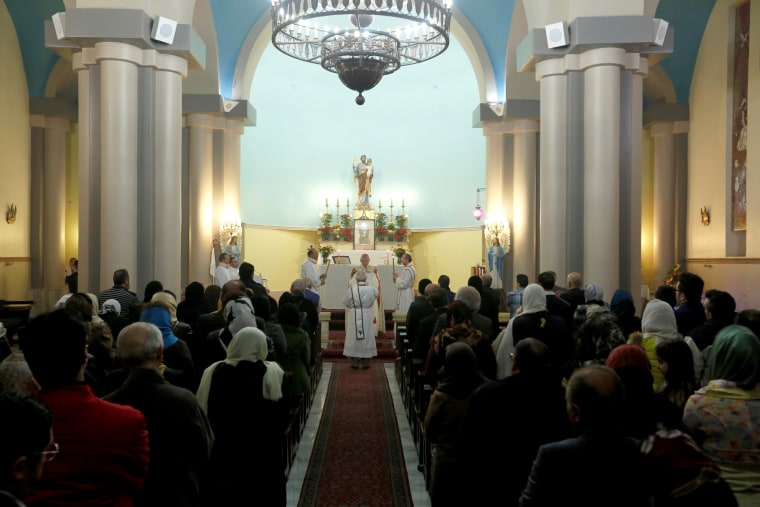U.S. authorities have allowed about a dozen Christian refugees from Iran into the U.S. after a federal court ordered their cases reopened, but the fate of hundreds of other Iranian refugees seeking American visas remains uncertain, lawyers said.
The small group of Iranians arrived in Los Angeles in recent weeks after a federal judge last year ordered the U.S. government to reconsider their applications, which had been previously denied.
The Iranian Christians are ethnic Armenians who sought admission under the Lautenberg-Specter law, which provides visas for members of religious minorities facing persecution and discrimination in the former Soviet Union and Iran. Until President Donald Trump took office, the program's acceptance rate had been close to 100 percent, humanitarian groups say.
Lawyers and advocates for the refugees welcomed the news that the Iranians had been granted visas and reunited with family in the United States. But they said other Iranians were still in the dark about their applications that had been pending for months and years.
The whole process is "completely shrouded" in secrecy, and U.S. officials have yet to explain why a small number of Iranian refugees were granted entry while others were not, said Martin Zogg, of the non-profit International Rescue Committee.
"There is absolutely no information and very little hope that any time soon the hundreds of cases of otherwise eligible refugees in Iran will be authorized to travel," said Zogg, the executive director of the IRC's office in Los Angeles.
Under Trump, the Lautenberg-Specter program has virtually ground to a halt for Iranians. The program includes what used to be a short processing stay in Vienna, but more than 70 Iranian applicants, mostly Christians, have been stuck in Austria for more than two years, their lawyers said. In the past, applicants would be granted U.S. visas after a period of few months in Austria, according to the lawyers and former U.S. officials.
Applicants in Ukraine and other former Soviet states have been admitted without major delays, humanitarian groups said.
"Those families in Vienna are still in pretty dire circumstances," said Kate Meyer, litigation staff attorney at the International Refugee Assistance Project, which had filed a lawsuit on behalf of the Iranians. "They are desperate to reunite with their family in the United States, they are very fearful of persecution if they are forced to return to Iran, and they lack permanent legal status in Austria."
The Department of Homeland Security, which delivers the final decision on the Lautenberg cases, declined to comment.
The State Department acknowledged that more applicants had been denied in the Lautenberg program, but a spokesperson said the department was not able to comment on the specific reasons why some applications have been approved and others denied.
"The increased denial rate was not due to the president’s executive orders but to changes in vetting implemented in 2016," the spokesperson said in an email, adding that new applications were still being accepted.
A federal court order last year required the Trump administration to reopen applications from the Iranians in Vienna, on grounds that U.S. authorities had not complied with the Lautenberg law's provisions to explain why requests for visas had been denied.
The lawsuit by the International Refugee Assistance Project also accuses the administration of making "arbitrary" and "capricious" changes to the Lautenberg-Specter program in violation of federal law. The court has not yet ruled on that part of the complaint.
Refugee advocates say the Lautenberg-Specter program appears to have been undercut by Trump's wider crackdown on immigration and refugees, with "extreme vetting" for those from mainly Muslim countries.
The stalled Iranian applications are part a broader decline in U.S. admissions for Christian refugees, despite the Trump administration's repeated promises to help vulnerable Christians in the Middle East and elsewhere.
The number of Christian refugees admitted to the United States declined by about 36 percent in fiscal year 2018 compared to the previous year, according to Lindsey Sharp, of the International Rescue Committee. The drop is part of a broader decline in overall refugee admissions.
Arghisht Allahverdi, 27, was among the small group of Iranians who arrived in the United States a few weeks ago, along with his brother and his parents.
Allahverdi told NBC News the 33 months waiting in Vienna were difficult, but his sister sent them money to survive and the local Catholic church helped his family with housing and other assistance.
"There were very kind people who supported us," Allahverdi said.
When he finally learned his visa application had been approved, he said he was "so excited."
"I didn't know what to do. At first, I didn't believe it."
But he said he was still thinking of fellow Iranians who were waiting to hear news on their cases.
"They are all in a really bad situation," he said. "I want to ask the U.S. government to let them come and join their families here."
